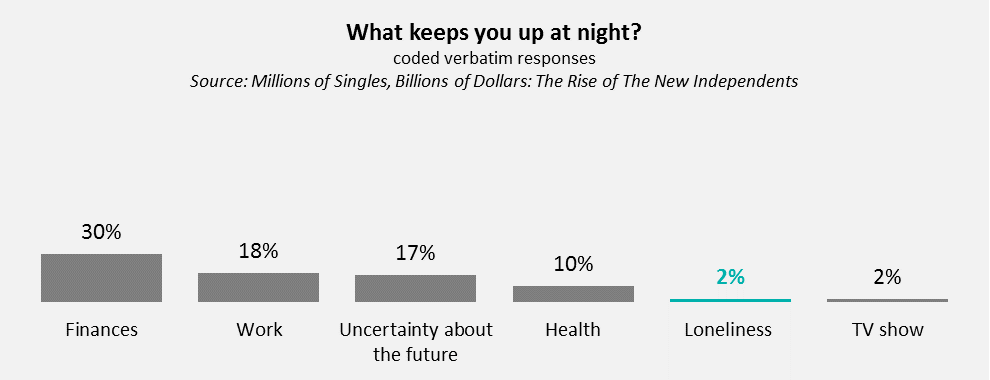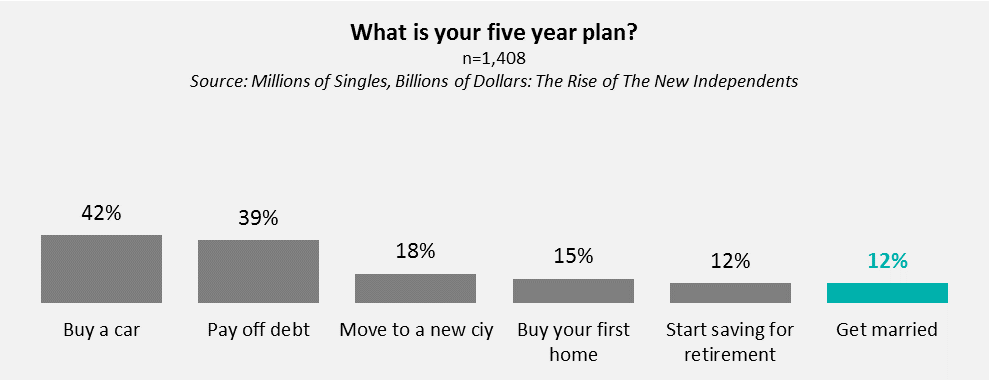
The New Independents (Singles) Attitudes Toward Relationships and Marriage
Filed Under: Market Research, Generations

Anthony Bahr
In June 2015, the Supreme Court effectively legalized same-sex marriage by ruling 5 to 4 that states are required to issue marriage licenses to same-sex couples, and that same-sex marriages conducted in one state must be recognized by all states.
In his majority opinion, Justice Kennedy declared, “marriage responds to the universal fear that a lonely person might call out only to find no one there,” and that being unmarried is the equivalent of being “condemned to live in loneliness, excluded from one of civilization’s oldest institutions.”
Michael Cobb, Professor of English at the University of Toronto, author of Single: Arguments for the Uncoupled, and one of the keynote speakers at The New Independents launch event, responded tongue-in-cheek with, “now all of us single people are pathetic, not just the straight ones.“
For as well-intentioned as Justice Kennedy’s reasoning may have been, it was based on an incorrect (though commonly held) set of premises:
- Premise 1: all single people are lonely
- Premise 2: nobody wants to be lonely
- Premise 3: marriage is the only cure for loneliness
- Premise 4: all single people want to be married
Indeed, when C+R and TPN began researching The New Independents, our coined name for the single population (the 50.2% of U.S. adults who are single), we too supposed that a majority would be in a transient phase of their lives and were actively seeking a change in their marital status.
Our research not only proved these hypotheses invalid, but it also told a much more complex story. One where singles are actually quite content with their marital status, and where marriage is an aspiration for only a few.
First, let’s debunk the myth that The New Independents are lonely.
It’s a prevalent misconception among the general population (gen pop), 62% of whom agree with the statement that single people are lonely – a stark juxtaposition to the 11% of singles who consider themselves to be lonely.
But even the handful of singles who identify as lonely rarely cite their solitude as a primary concern in their lives – finances, work, uncertainty about the future, and health are all more top-of mind concerns than being lonely. To put it in further context, there are just as many singles who say they worry about being lonely as there are who worry about what is going to happen on their favorite TV show.

Feelings of loneliness among singles are likely mitigated by the fact that compared to the gen pop, The New Independents often spend significantly more time socializing with friends, whom they often consider just as important as family.

If The New Independents are not lonely, and if non-marital relationships can be just as effective as marriage at fulfilling a person’s physiological need for human interaction, then marriage must be headed for obsolescence, right?
Wrong.
For while the primary reason The New Independents say they are single is because it is simply the life they have chosen for themselves, they neither reject the institution of marriage nor do they reject the possibility that they may someday decide to wed. They are skeptical toward marriage, but they do not outright rebuff it.
Their skepticism toward marriage is perhaps fueled by the lack of a compelling reason to believe. Singles rarely agree with the following statements:
- Marriage offers benefits not available to single people (19%)
- Marriage is an important institution in our society today (14%)
- Marriage is a good way to improve financial stability (8%)
- Married people are more emotionally stable (4%)
Even in the absence of a persuasive reason to marry, many of The New Independents (44%) say they would be open to getting married if they found the right person. But this open-mindedness does not imply urgency. When asked what their five-year plan looks like, only about 1 in 10 singles said they saw themselves getting married.

Marketing Implications
The New Independents represent a chronic blind spot to many marketers. And, as we approach Valentine’s Day, a major milestone on the planning calendars for many brands, it may be time for marketers to re-evaluate their messaging with an eye to how it may resonate among singles.
If half of your target market (depending on your category) is composed of singles, then marketing – at least good marketing – should reflect and respect these households of one. Consider the following:
- A majority of singles are not lonely; on the contrary, they have active and fulfilling social lives and they are unlikely to respond favorably to messaging which portrays them as, in Justice Kennedy’s words, “condemned to live in loneliness.”
- Compared to the gen pop, singles spend significantly more time with friends, and these friends often serve as a proxy family. In the minds of singles, these families by choice deserve as much recognition and opportunities for celebration (e.g. Valentine’s Day) as families by blood.
- Being alone does not need to carry a negative connotation and for some, solitude is aspirational and does not require fixing. Tread lightly when positioning a brand or product to fill a void which may not exist.
- Marriage is not something to which many singles aspire, and marketers need to realize that heteronormative portrayals of nuclear families will only resonate with an increasingly small segment of consumers.
- Being single is not a temporary life stage synonymous with being a Millennial (all of the singles in our quantitative survey were between the ages of 30 and 50), and the average age of a first marriage is quickly trending upward.
To find out more about marketing to The New Independents, download our whitepaper which provides more details on the study we conducted with TPN and the implications for marketers.
explore featured
Case studies
